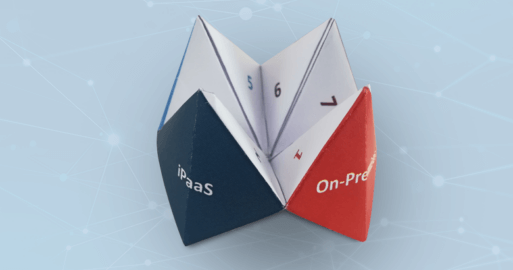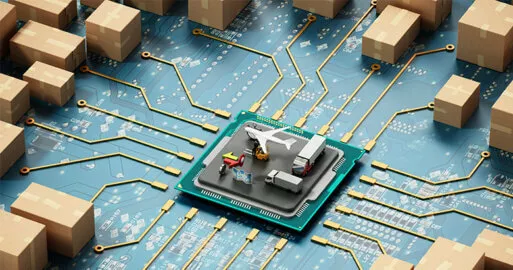Who Wants to Be a Millionaire? How an Integration Platform Stops Your Logistics Startup From Falling off the Board. A Partnership Model for Integrating Logistics and Other 3rd Party Services

In theory it’s easy. A logistics startup is successful if an ambitious team of entrepreneurs get their innovative (cloud) services to market quickly so they can network and drive growth.
HOWEVER, only 10% of startups are successful.¹ This takes us to our first question: How can you make life easier by cooperating with an integration specialist for digital logistics? This article has the answer.
1. From a digitalized supply chain to omnichannel logistics: What are the current trends and needs for logistics startups?
Let’s start by taking a look at the five hottest logistics trends from the 2022 startup scene.² It quickly becomes clear that the reason for the low success rate of startups is not the entrepreneurs nor their innovative offerings. As can be seen in figure 1, the market and the opportunities are huge.

What are the five most important startup trends in logistics?
- Digital supply chain
New technologies let you monitor and control supply chains in real time. AI-powered data analytics and integrating systems and services open up a wealth of further opportunities.
- Robotics and automation
Intelligent robots and people working together, as well as a high degree of automation, results in higher productivity with lower costs.
- Smart concepts for the last mile
New modes of transport, innovative distribution concepts and the use of micro hubs are saving large urban areas from gridlock. - Omnichannel logistics
Order from anywhere and get the goods delivered anywhere at any time, that’s the customer service people now expect. The first step is a digitalized supply chain. - Sustainability through innovation
In the more affluent parts of the world, customers are now calling for greater sustainability in transport, storage and packaging; services which are being performed in other regions. The transparency this requires is now being recognized in laws.
So far so good. It’s the dark blue area on the left-hand side of the image where the majority of entrepreneurs stumble. The million dollar question is therefore:
How can you
a) Accelerate time to market, by
b) Building a network to
c) Drive growth – and still stay in control?
To warm up, let’s start with eight questions for startups that test your general knowledge on 3rd party logistics, integrated logistics, 3rd party cloud services, logistics networks and time to market.
2. Who wants to be a millionaire? A time to market quiz for startups in logistics and elsewhere
1. Companies that deal with transport and warehousing for clients are called
- First tier suppliers
- Second hand shops
- Third party logistics providers
- The fourth wall
2. Logistics providers who make process data available in real time, are
- multiplied
- divided
- differentiated
- integrated
3. Excellent systems integration requires the right mix of which technologies?
- ABS/ESP/ASR
- DIN/ISO/TÜV
- EDI/API/MFT
- ALK/THC/ASS
4. API stands for
- All Pie In-the-sky
- Application Programming Interface
- 14159265…
- Angrily Processing Information
5. Integrating cloud services and backend systems is a job for
- Specialists
- Masochists
- Socialists
- Activists
6. SEEBURGER is known for
- Nuts and dried fruit snacks
- Aesthetically pleasing fast food
- Rosé wine from Lake Constance
- Seamless systems integration for over 10,000 clients
7. Why do so many startups fail?
- Too few ideas
- Time to market too long
- Too much money
- Old technology
8. Which question should a startup ask its prospects?
- What about if we lower the price for you?
- Can we just quickly go on your IT system?
- When will you be back in touch?
- Do you use SEEBURGER?
What do you think? Do you need the phone a friend lifeline? Let’s take a look at a typical startup journey.
3. Systems integration for different startup scenarios in the logistics industry
Your startup journey may well have begun with a good idea from the insights you gleaned from your work experience. Or, maybe you saw new technologies while studying which could revolutionize established or untapped markets.
You have diligently done all the groundwork for your startup, and, with the support of your partners, your family and maybe even external financiers, have taken the first steps onto the public stage – and into personal risk. It’s at this point – at the latest – that marketing and sales pressure begins to materialize.
You may have celebrated your first successes and already gained a small customer base. You are active on the most important media channels, but, progress is slower than expected and your financial and mental resources are dwindling. And, again and again, you’re getting this sobering feedback from prospects:
I’m impressed by your offering, but I’ll need it integrated to my ERP/transport management system/warehouse management system
Does this sound like your business?
What do you do?
- Let the prospect go?
- Get bogged down in lots of individual integration projects
- Find an experienced integration partner who can bring the skills you need to the table?
Remember, the integration platforms of today specialize in modern cloud integration, data integration and application integration as well as the classic B2B and B2G EDI-based integrations (including browser-based access through WebEDI). They have a range of capabilities including API management, MFT, event-driven data streaming, database functionality, A2A & EAI, automation, MQ, and a hub for integrating edge devices.
Do you really want to pour your limited IT resources into these areas when there are specialist partners with a 40-year head start and a world-wide reputation for expertise?

Maybe you should just ask your prospects “Do you use SEEBURGER?”
If your partner starts talking about dried fruit or fast food, enjoy the small talk and end the conversation in a friendly, dignified way.
If the answer is “of course!” you are speaking to one of the over 10,000 companies worldwide who use our integration services. Your business partner is already 100% integration capable.
4. Easy logistics integration with SEEBURGER Connectors
One hundred percent integration capability means that there is already a connection with the in-house systems, or that tools are available for this. Integration is no longer a project, rather a question of connectors.
Of course, you – or your prospective customer – could create a connector. However, if you get SEEBURGER to do this, a connector to your commercial services can be placed in our content library. Then, you’ll only need to tell prospective customers:
“Do you also use SEEBURGER? Great! You’ll find a tested, release-ready connector to our services in their content library.”

SEEBURGER’s connectors enable you to effortlessly and reliably connect and integrate a wide variety of endpoints. This makes your workflows more efficient with very little programming required. The connectors provide seamless connections to common SaaS applications, interfaces, protocols and (cloud) services. This enables you to drive your business integrations across your entire ecosystem faster and more easily. The SEEBURGER connectors include the following advantages:
- > 20,500 mappings available
Ready to use in the SEEBURGER Cloud Integration Service. - A standardized approach
Immediate backend connectivity thanks to ETL using the canonical format SEEXML. - Easy access and clear directions for onboarding new trading partners
Provided with the integration documentation should you need to test and implement new functions where the ERP interfaces with a process.

5. Drive the growth of your startup
And now it’s become easier, as startup trends and needs go hand in hand.

Your innovative (cloud) services and a partnership with an integration specialist help you get to market faster, build business networks and drive growth.
With SEEBURGER, you have a partner at your side who has been shaping its customers’ IT landscapes since 1986 with the SEEBURGER BIS Platform, a cloud-based, secure, agile and scalable integration platform. Seamlessly connect and integrate applications, technologies and services across your entire digital ecosystem. Whether in the cloud, a hybrid environment or on-premises.
By collaborating, you can a) accelerate your time-to-market by b) leveraging networks to c) increase growth speeds – while staying master in house.
Case Study
CargoCast is a start up in the logistics arena that makes predictions on cargo flow based on integrated logistics data and artificial intelligence. This is supported by the SEEBURGER BIS platform. Take a look at this fascinating case study. Would you like to talk to us in person? We’ll be at the Logistics Summit in Düsseldorf on October 11-12 2023. Come and visit us !
Download¹ cf.: Warum so viele Startups scheitern! | 4investors (last accessed 19.07.2023).
² cf.: Die 5 heißesten Logistik Trends der Startup Szene 2022 – Founders Foundation (last accessed 19.07.2023).
Thank you for your message
We appreciate your interest in SEEBURGER
Get in contact with us:
Please enter details about your project in the message section so we can direct your inquiry to the right consultant.
Written by: Dr. Volker Schäffer, Dirk Gawlick
Dr. Volker Schäffer and Dirk Gawlick are the core logistics team at SEEBURGER. A mathematician and computer scientist, Volker has been with SEEBURGER since 2004. The projects he has initiated for process optimisation in the supply chain have received several external awards. Dirk initially gained logistics experience at several well-known logistics companies and has been SEEBURGER Account Manager since 2017.





